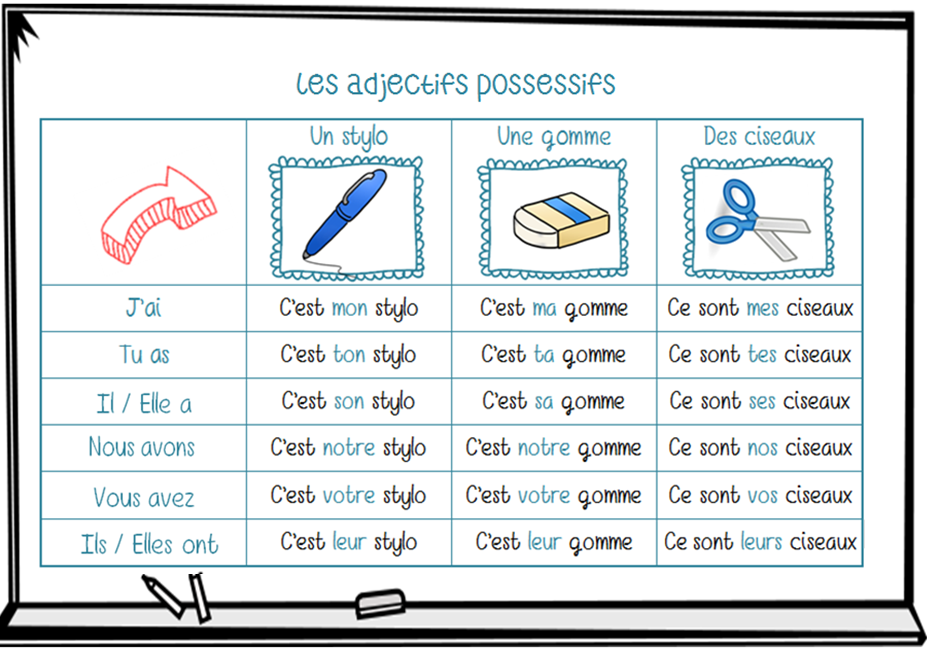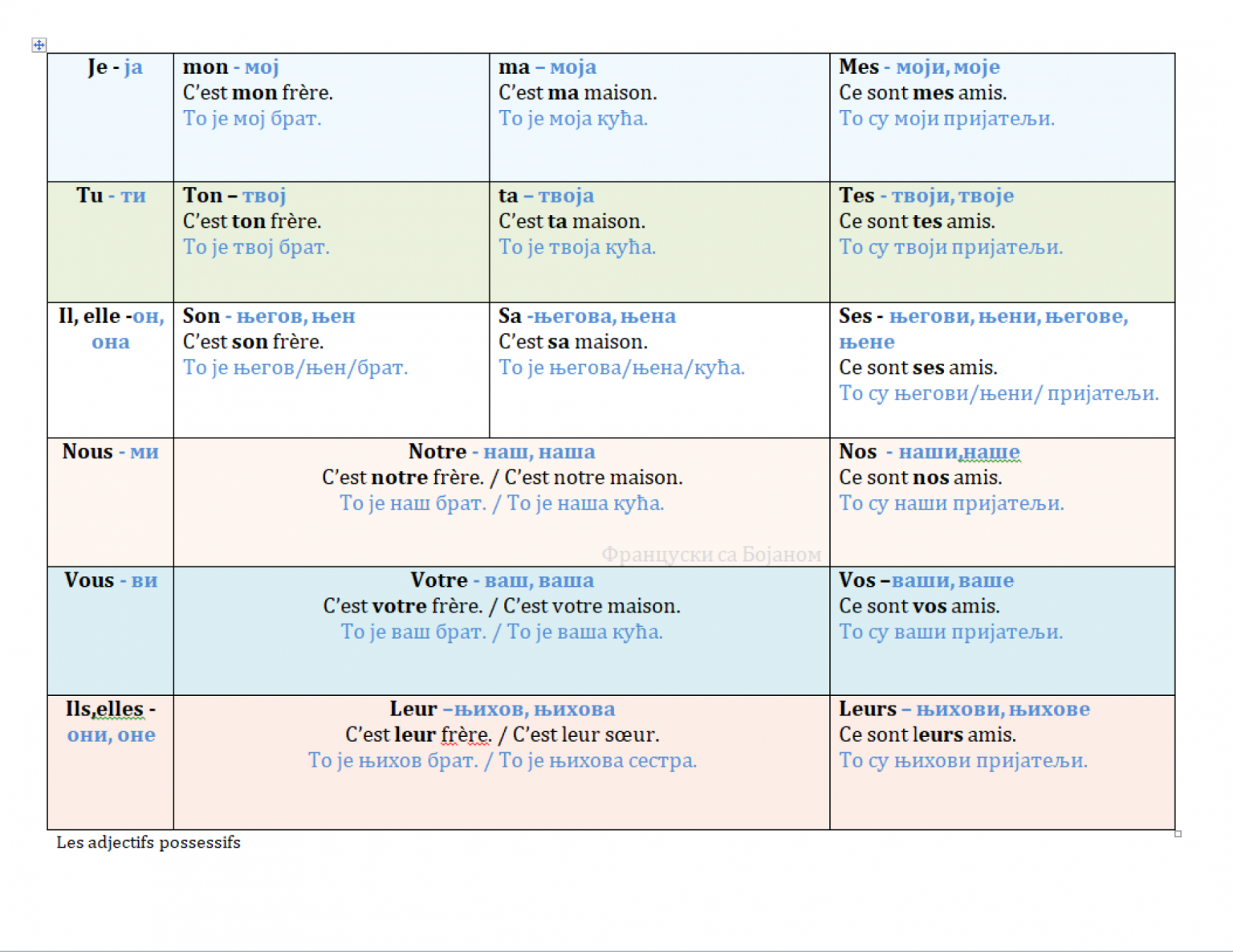
Épinglé sur French
To put it simply, everytime a noun starts with a vowel, even when feminine, you'll need to use the masculine possessive adjectives which all end with a consonant — N, to be accurate. Let's take a couple of examples: You shouldn't say "Ma amie" but "Mon amie". You shouldn't say "Ma île flottante" but "Mon île flottante".

Les adjectifs Possessifs
Zaimki przymiotne dzierżawcze - język francuski. Zaimki przymiotne dzierżawcze nazywane w języku francuskim les adjectifs possessifs służą do określania do kogo należy dana rzecz, ewentualnie osoba, np.: mój brat, nasze książki, twoja siostra, etc.. Pamiętajcie, że zaimki te zgodne są z posiadanym obiektem, a nie osobą, która go ma, zasada jest taka sama jak w języku polskim.

Les Adjectifs Possessifs French Assignment Teachmint
Cours et exercices gratuits sur les possessifs. Apprendre le français. Cours et exercices gratuits sur les possessifs. Apprendre le français. Aller au contenu principal;. Tous les possessifs; Adjectifs possessifs : ma, ton, ses, notre, vos, leurs etc.

Les Adjectifs Possesifs igeglo
NB: the possessive adjectives mes, tes, ses, nos, vos, leurs are the plural form of both the masculine singular possessive adjectives (mon, ton, son, notre, votre, leur) and the feminine singular possessive adjectives (ma, ta, sa, notre, votre, leur). This means that where mon & ma are used mes should be there.

ADJECTIFS POSSESSIFS EXAMEN Les adjectifs possessifs, Fle, Fiches
The possessive adjective always comes before the noun which is "owned," just like in English. Note that when a possessive replaces a noun altogether (yours, his, hers, etc.), it's a pronoun, not an adjective. French adjectives change to reflect the gender and number of the noun they're describing. This means that there are different.

Los posesivos en francés. Les adjectifs possessifs, Les
Types of French adjectives. In French, there are two types of adjectives: les adjectifs épithètes and les adjectifs attributs.Do you know the difference? Read on if not! L'adjectif épithète is an adjective that refers directly to a noun and usually comes after the noun it describes (although sometimes they come before). These adjectives cannot be separated by another word.

Épinglé sur Cm1
In French, we call them les adjectifs possessifs (un adjectif possessif in singular form). Before going further, let's try to understand the difference between how they are used in English and French. Possessive adjectives: French vs English. In English, possessive adjectives are used before a noun to show who owns it. For example: It's my.

adjectifs possessifs, pronoms possessifs et pronoms personnels Les
Француски са Бојаном / Francuski sa Bojanom. Вежбање француског језика. 2 одговора на „Les Adjectifs possessifs, exercices - Prisvojni pridevi, vežbanje" ops каже: 25. септембра 2020. у 11:20 pm. Zdravo!

Les adjectifs possessifs Присвојни придеви Француски са Бојаном
#français, #francuski, #adjectifspossessifsKo ima mogućnosti i želi da podrži moj rad, može uplatiti donaciju putem PAYPAL-ana sledeću e-mejl adresu: sasa.ar.

Adjectifs possessifs, réponses incluses jewelryadjectives
When listing down nouns, French possessive must be used in front of every noun. In English, the possessive adjective only needs to be used once. For example; Mon fils, ma fille et mes petits-enfants. - My son, daughter, and grandchildren. The adjectives "mon," "ma," and "mes," have to appear before the nouns.

ADJECTIFS POSSESSIFS EXAMEN
Les adjectifs possessifs sont utilisés pour exprimer un rapport de possession entre des personnes et des choses ou une relation entre des personnes (lien social, parenté, rapport professionnel, etc.).. Possessive adjectives are used to express a possessive relation between people and things or a relationship between people (social bond, kinship, professional relationship, etc.).

démonstratifs French Teaching Resources, Teaching French, French
The English possessive adjectives are my, your, his, her, its, our, and their. French has many more possessive adjectives because they have to agree in number and sometimes gender with their nouns. Singular subjects have three possessive adjectives: masculine, feminine, plural. my = mon, ma, mes. your = ton, ta, tes.

adjectifs possessifs, pronoms possessifs et pronoms personnels French
Adjectifs Possessifs. Possessive adjectives like other adjectives, agree in gender and number with the nouns they modify. mes livres my books. tes amis your friends. ma voiture my car. mon passeport my passport. leurs enfants their children. The forms mon, ton, and son are used instead of ma, ta and sa before a feminine singular noun beginning.

285 best images about FLE les adjectifs on Pinterest Student
A man would say mon livre when talking about a book, and a woman would also say mon livre. The book is masculine, and therefore so is the possessive adjective, no matter to whom the book belongs.Likewise, both men and women would say ma maison, because "house" is feminine in French.It doesn't matter whether the owner of the house is male or female.

Les adjectifs possessifs Присвојни придеви Француски са Бојаном
Adjectifs possessifs. French possessive adjectives are used in front of nouns to indicate to whom or to what those nouns belong. They are considerably more complicated than English possessive adjectives because French has several different forms depending on the gender and number of the possessed noun. Par exemple…

FLE Les pronoms possessifs
Possessive pronouns and determiners (les déterminants et pronoms possessifs) indicate possession or belonging. They agree in gender and number with the noun that they describe (determiners) or replace (pronouns). Learn all about possessive pronouns and determiners in French grammar with Lingolia's quick and easy examples, then put your.